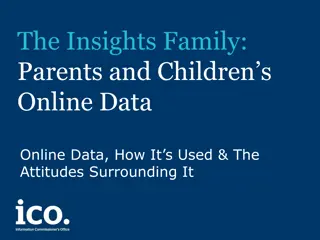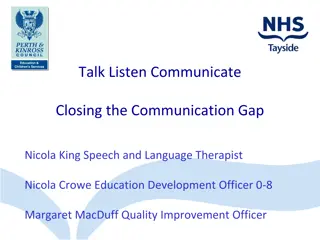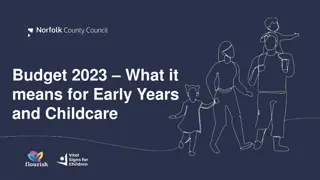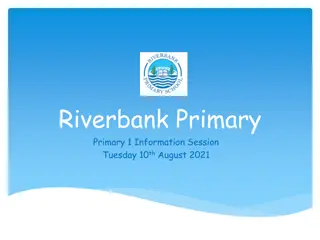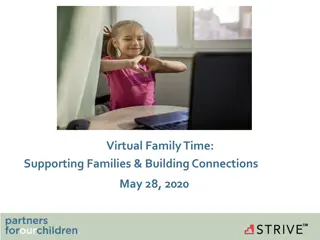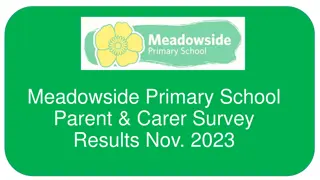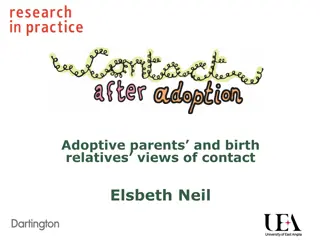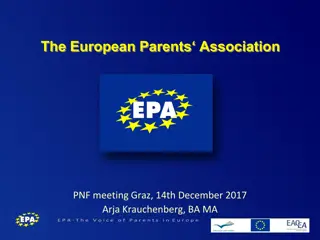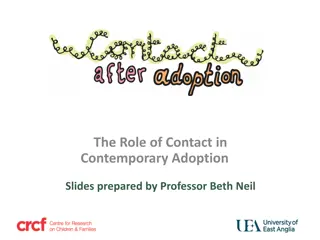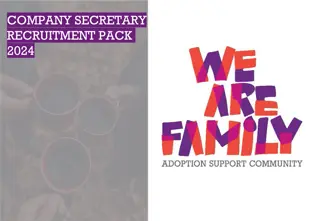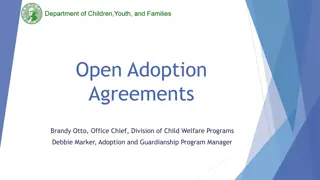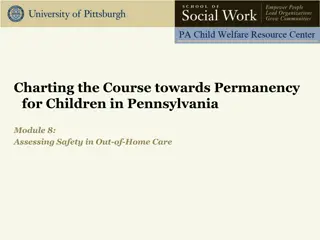Understanding and Supporting Adoptive Parents: Enhancing School Environments for All Children
This content emphasizes the importance of creating a supportive and inclusive school environment for adoptive parents and their children. It addresses key issues such as avoiding shaming tactics, meeting with parents to discuss backgrounds, curriculum considerations around adoption education, trauma-informed practices, rethinking behavior management, and understanding behavior as communication. The focus is on empathy, understanding, and creating a nurturing school culture that benefits all children.
- Adoptive Parents
- School Environment
- Trauma-Informed Practices
- Behavior Management
- Adoption Education
Download Presentation

Please find below an Image/Link to download the presentation.
The content on the website is provided AS IS for your information and personal use only. It may not be sold, licensed, or shared on other websites without obtaining consent from the author. Download presentation by click this link. If you encounter any issues during the download, it is possible that the publisher has removed the file from their server.
E N D
Presentation Transcript
Adoptive parent group feedback Do not shame, eg leaving out of group activity/sitting at side for all to see; going down the rainbow or loss of reward time Meet parents to discuss background and useful info opportunity to reflect and review as they move through school Curriculum hotspots through year, eg PSHE who do I look like? How is adoption taught and how is it placed in the context of other types of families?
Getting it right for all children Adoption-friendly school Trauma Attachment Culture, understanding Parents Whole school approach all adults
Rethinking behaviour management Behaviour systems and charts on the wall can feel like public shaming Time out or taking away from the class can send children deeper into a stress response can recreate early trauma they need an adult by their side
Behaviour as communication Behaviour that may be expressing .. (not in order) I don t feel safe I don t trust you I feel rubbish/stupid I am overwhelmed This reminds me of the past I want you to like me I need to protect myself Continual talking & noises Not sitting still/getting up Hurting others Taking things Anger outbursts Controlling situations Telling lies
Head, Heart, Hands If your default response to behaviour that is beyond the normal range is empathetic, kind and keen to understand what is being communicated, you will never go far wrong. Your knowledge of the person is more important than your knowledge of the label. (Paul Dix)
Sanctions Heavy sanctions meet the needs of some adults but they rarely meet the needs of the child. Paul Dix
Whats in Rainbow recognition EY yr2 What s out Moving down the rainbow or onto the raindrop Recognition boards yr3 - 6 House points Clouds, raindrop, names on board Using other recognition strategies in the moment Head, Heart, Hands clubs R and R time (Rights and Responsibity time like Golden Time) Steps to support positive behaviour/repair time Loss of sparkle time or R and R time
What can we do? Know our adopted children and adoptive parents - they are all different and have different needs Prioritise relationships All adults the atmosphere created by how we speak to and relate to children not just adopted children and to each other, as adults
Find the joy with the child what will they allow themselves to take joy in? How do they express that joy?






